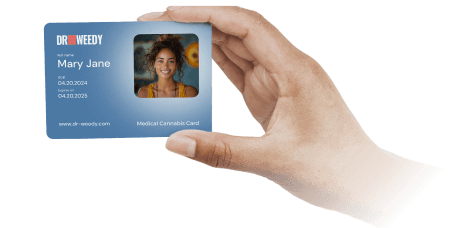Arizona medical marijuana card FAQ
Patients who are unable to take care of themselves and use medical cannabis responsibly, and patients under 18 who qualify for a medical marijuana card, can designate a caregiver in Arizona.
All information related to the state’s medical marijuana program is treated with strict confidentiality under the Arizona Open Records Law. According to Section 36-2810 of the AMMA, patient information in the medical marijuana registry is confidential and is not subject to disclosure. But, law enforcement officers can obtain a search warrant to get access to medical marijuana records if the patient is accused of committing a marijuana crime.
Only an Arizona-licensed physician can prescribe medical marijuana in the state. According to state law, only a physician with a bonafide patient-physician relationship can issue a medical certification to a qualifying patient. Physicians specializing in allopathic, homeopathic, osteopathic or naturopathic medicine can prescribe medical marijuana.
Yes, you must be a resident in Arizona to obtain a medical marijuana card under the medical marijuana program.
According to the AMMA, government medical assistance programs and private health insurance businesses are not required to reimburse costs related to medical use. So, medical marijuana is not covered by insurance in Arizona.
Patients with a valid medical card can visit a medical marijuana dispensary near them to purchase marijuana. If the dispensary is more than 25 miles away from your primary residence, you can cultivate marijuana privately.
When visiting a medical marijuana dispensary in Arizona, you should provide your government-issue ID and medical marijuana card. Without the card, you can only purchase one ounce of recreational cannabis as long as you are 21 years or older.
To apply for a medical marijuana card in Arizona, you need to first obtain a medical marijuana certification. Dr. Weedy offers an online evaluation for this Medical Marijuana Physician Certification Form at a cost of $149, with a guaranteed refund in case of denial. Once you have your certification, the application fee of a medical marijuana card in Arizona is $150. Under the Supplemental Nutrition Assistance Program, the application fee is $75. For patients designating a caregiver, an additional caregiver application fee of $200 is required.
A minor can get a medical marijuana card if they are diagnosed with a qualifying medical condition and obtained written certifications from two Arizona-licensed physicians. Also, they must obtain the consent of a parent or legal guardian who will act as a caregiver, and submit a signed Medical Marijuana Custodial Parent or Legal Guardian Attestation Form.
To register with the Arizona medical marijuana program, you should obtain a medical marijuana certification from a licensed physician. Then, create an account with the AZDHS Licensing Portal and submit the required documents, including a valid identification document, electronic consent and signature, request to cultivate (if applicable), recent digital photograph, and medical marijuana physician certification form. Wait for approval within 10 business days.
To apply for a medical marijuana card in Arizona, you will need the following:
- Personal Information
- Full name (including middle initial and suffix, if applicable).
- Date of birth and gender.
- Residential and mailing addresses (if different).
- County of residence and phone number.
- A valid email address for confidential communication.
- Physician details, including their name, address, phone number, license number, license state, and license type.
- Supporting Documentation
- Identification Document:
Provide one of the following:- Arizona driver’s license issued after October 1, 1996.
- Arizona identification card issued after October 1, 1996.
- U.S. passport or passport card.
- For older Arizona licenses (issued before October 1, 1996), additional proof of U.S. citizenship, such as a birth certificate or naturalization certificate, is required.
- Medical Certification:
A Medical Marijuana Physician Certification Form completed by a licensed physician. - Photograph:
- A recent photo (taken within 60 days) in natural color.
- Dimensions: 2x2 inches, 600x600 to 1200x1200 pixels.
- White or off-white background, full-face view with no obscuring headgear.
- Patient Attestation Form:
A signed and dated attestation available for download from the Arizona Department of Health Services (ADHS) website. - SNAP Documentation (if applicable):
If you participate in SNAP (Supplemental Nutrition Assistance Program), provide proof such as an eligibility notice or an EBT card.
- Payment Information
- A valid Visa or MasterCard for payment (credit, debit, or prepaid cards are accepted).
- Additional Requests (Optional)
- Request to cultivate marijuana if living more than 25 miles from a dispensary.
- Notification about clinical studies related to medical marijuana.
For the most accurate and up-to-date requirements, refer to the ADHS Medical Marijuana Program website.
It takes about 10 working days for the Arizona Department of Health Services to review and approve applications for a medical marijuana card.
You can only apply for a medical marijuana card online through the state’s portal. Also, the state allows physicians to use telemedicine to evaluate patients and issue medical marijuana certifications.
To renew your medical marijuana card in Arizona, access the Arizona Department of Health Services portal within 90 days of your card’s expiration date. Enter your current card number to access the renewal application. Provide the following:
- A new physician certification.
- A current digital photograph.
- A new patient attestation form.
- Updated SNAP documentation (if applicable).
- A copy of your identification if your name has changed since your last application.
Also, pay the non-refundable renewal application fee of $150 (or $75 if SNAP-eligible). Note that renewing after your card expires will require submitting a new application.
You can start the renewal process up to 90 days before your card expires. The Arizona Department of Health Services typically processes applications quickly—often within a few hours using their new portal system—but they are legally allowed up to 5 business days. Make sure your physician certification is dated within 90 calendar days of submitting your renewal application. Once approved, the department will issue the new marijuana card promptly.
The Arizona medical marijuana card is valid for two years from the issue date. Cardholders are expected to start the renewal process 90 days before it expires. Keep in mind that the associated caregiver’s card will also expire and would require renewal.
If you miss your renewal deadline, you would have to submit a new application for yourself and your designated caregiver.
Yes, caregivers need to renew their Arizona marijuana card. Caregivers need to pay a fee of $200 to renew their card. It expires once the related patient’s card expires.
Yes, you can update your personal details, including your name, address, or email, during the renewal process. Be sure to provide identification that supports any changes you make.
Yes, you can update your cultivation status during the renewal process and make new decisions about designating a caregiver. Keep in mind that only the qualifying patient or the designated caregiver—not both—can be authorized to cultivate.
Weed is legal in Arizona for medical and recreational use. Patients who qualify can get a medical marijuana card and receive medical cannabis treatment. Adults who are 21 years and older can purchase marijuana with a valid ID card.
Medical marijuana patients can grow six to twelve marijuana plants in an enclosed space. This is only allowed for patients who live more than 25 miles from the nearest dispensary. Meanwhile, recreational marijuana patients can grow up to six plants in an enclosed space.
Yes, taxes apply to cannabis purchases in Arizona, but the type and amount depend on whether you are a medical or recreational user:
- Medical Marijuana: Products purchased with a valid medical marijuana card are subject to the standard 5.6% sales tax.
- Recreational Cannabis: Recreational cannabis purchases are subject to both sales tax and a 16% excise tax.
Having a medical marijuana card can help reduce costs, as you avoid the additional excise tax applied to recreational cannabis.
Yes, you do. There are no Arizona state laws that prevent patients from obtaining firearm licenses and buying guns. So, you can say that Arizona laws allow medical marijuana patients to own and possess guns. But, marijuana remains illegal at the federal level. If you want to purchase a new firearm in Arizona, you need to complete the ATF Form 4473. One of the questions would be whether you are an ‘unlawful user of, or addicted to, marijuana’. Even as a medical marijuana patient, you have to answer Yes. By checking Yes, you are prohibited from making the purchase.
No, medical marijuana is not a reason for labor discrimination. According to the Arizona Medical Marijuana Act, all employers are not allowed to discriminate against MMJ cardholders simply because they take marijuana outside of work. The exception is if this would cause an employer to forfeit monetary or licensing-related benefits.
No, you can’t. Arizona does not allow smoking cannabis in any public place and places of employment. It is punishable by a fine of up to $500 for a first-time offense.
Yes, you can register as a visiting patient in Arizona although you will not be permitted to buy medical marijuana. You can only possess and use marijuana without legal consequences.
Get your medical marijuana card
Plant your health with Dr. Weedy. Get all the benefits of a medical card at a low price for 2 years





























